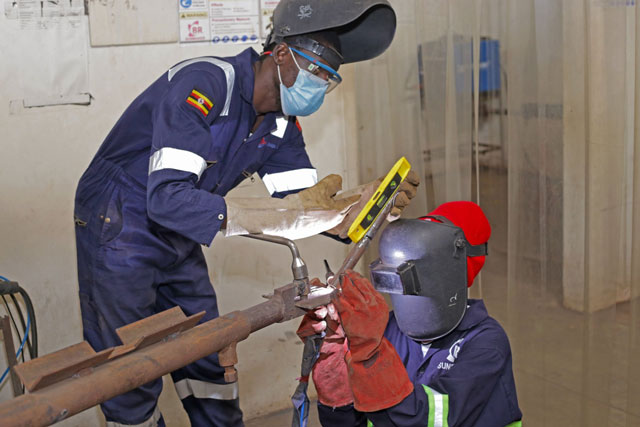
Over 16 sectors have by law been ring-fenced for local companies. Transport, security, foods, beverages, hotel management and catering, human resource management, office supplies, fuel supplies, land surveying, clearing and forwarding, locally available construction materials and civil works
COMMENT | ABDUL KIBUUKA | Sixteen years since commercially viable oil deposits were discovered in the Albertine Graben region, Uganda has finally set its eyes on the development phase of oil and gas, where project facilities to support the extraction of Uganda’s resources will be constructed over a period of about 3 years. This phase presents immense opportunities for Ugandans looking for employment.
Over 16 sectors have by law been ring-fenced for local companies. These include; transport, security, foods, beverages, hotel management and catering, human resource management, office supplies, fuel supplies, land surveying, clearing and forwarding, locally available construction materials and civil works.
The Petroleum Authority of Uganda estimates that about 14,000 people will be directly employed by Ugandan companies, while about 45,000 people will be indirectly employed by the contractors. An additional 105,000 people will benefit from induced employment as a result of demand for services to support the oil and gas sector.
This could be the much-needed remedy for the economic blow that COVID-19 dealt on Uganda, which forced household incomes to fall as firms closed and jobs were lost, particularly in the urban informal sector.
The Country Private Sector Diagnostic released by World Bank and International Finance Corporation indicates that as a result of the pandemic, the rate of work stoppage was higher in urban areas (28 percent) and in services sectors (33 percent). The employment rate also declined significantly from about 87 percent in March 2020 to 70 percent in June. For Uganda to keep up with the pace of labor force entrants, it must create more than 600,000 jobs per year before 2030 and 1 million jobs per year by 2040.
The discussion around oil and gas has sometimes been characterized by questions like what courses or academic qualifications will be marketable in oil and gas. What must one study to position themselves better for employment?
How to get job ready
For the ordinary Ugandan, there are three ways to prepare for employment opportunities in the oil and gas sector. The first, is to is to find out the knowledge and training required for the job you are aspiring to do and then obtain that or qualification. Do your homework by either consulting an employment agency like True North or checking the job descriptions when the Oil and Gas are advertised.
Fortunately, the law requires oil and gas employers to advertise their jobs in the media and these adverts will indicate the knowledge and training requirements for each job. Remember that Oil and Gas is a very broad value chain that employs skills from varied disciplines, only a few jobs will require specialized training in Petroleum related studies e.g., petroleum engineering, petroleum geology, petroleum geophysics etc. Majority of jobs will require knowledge and skills that are cross cutting and transferable from other industries. If you don’t have the right qualifications, try and get the qualification.
Second, if you have the qualifications, ask yourself whether you have the experience required. This does not necessarily mean you must have worked in the oil and gas sector. You could have worked in a related sector or industry and as such, you understand the career basics or you have been in a similar environment, which implies you can transfer your skills to the Oil and Gas sector. For example, it shouldn’t be hard for a mechanical technician working in a manufacturing plant at a beverage company to work as a mechanical technician at a petroleum plant, because the fundamentals are the same. Therefore, try and identify the transferrable experience.
There is also some industry knowledge and skills that are essential to the oil and gas industry and are required for all professionals working in the industry irrespective of their domain of work. For example, with knowledge of Health, Safety and Environmental (HSE) compliance is basic requirement for all professionals in Oil and Gas irrespective of their work domain; Engineers, Finance, HR, Logistics professionals are all required alike to have knowledge of HSE If you have the means, it would be ideal to attain a Diploma or Certificate in Health and Safety, as well as aspects around environmental awareness as part of your preparation to join the sector.
And you can get these certifications from different places. Some people need to go back to the university to attain a degree, others need to go to a technical college like Uganda Petroleum Institute Kigumba (UPIK) or to Uganda Industrial Research Institute (UIRI) at Nakawa and other private technical training facilities. It depends on one’s field and the level of certification required.
With the increasing uptake in internet use, training is going to get cheaper because it has been digitized. There are local and international platforms people can go to for oil and gas training for instance the recently launched TotalEnergies EP Uganda Tilenga Massive Open Online Course (MOOC) which is giving an opportunity to about 150 Ugandans to acquire highly desired knowledge and skills in the oil and gas sector and subsequent training will prepare them to work. At the global level, there’s a plethora of online training institutions which offer internationally recognized certifications like NEBOSH, OPITTO and others.
Oil and gas is an international business. The more Ugandans are skilled in this field, the greater the number of Ugandans who are eligible to go and work in other countries. The same way we see expatriates come to Uganda and earn a lot of money because they are expats, is the same way we want to see Ugandans go work in oil and gas projects in Nigeria, Mozambique, Venezuela or Canada. I therefore urge my fellow Ugandans to start preparing for the numerous opportunities in the sector today. It’s not too late; the production cycle is anticipated to take another 30 years; we haven’t even commenced the first year of production.
Finally, the 3rd way to prepare for participation in the sector is by looking for available vacancies. The law requires oil and gas employers to advertise their jobs in the media, but job seekers should note that media will become increasingly digitized. They should check both the traditional media and other online sources including regularly visiting the website of Total Energies and its major subcontractors and suppliers as well as the websites of Recruitment Agencies.
*****
 Abdul Kibuuka is Executive Director, True North Consult Ltd
Abdul Kibuuka is Executive Director, True North Consult Ltd
 The Independent Uganda: You get the Truth we Pay the Price
The Independent Uganda: You get the Truth we Pay the Price



As a chemical engineer with an interest of working in the oil and gas sector am impressed, though currently working with coca-cola beverages Africa.
For any available opportunities i request that i lemme me keep posted here
What Combination and what courses